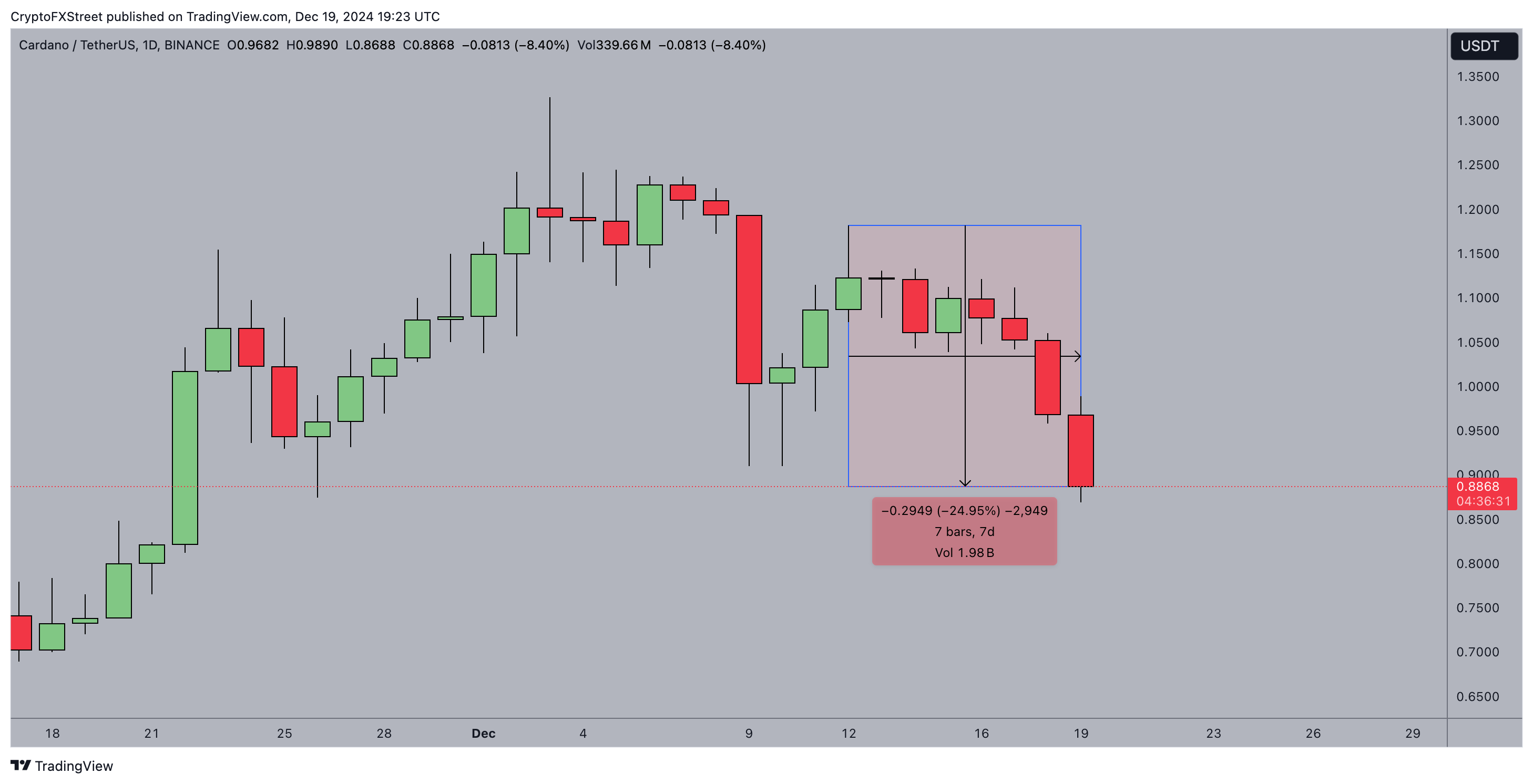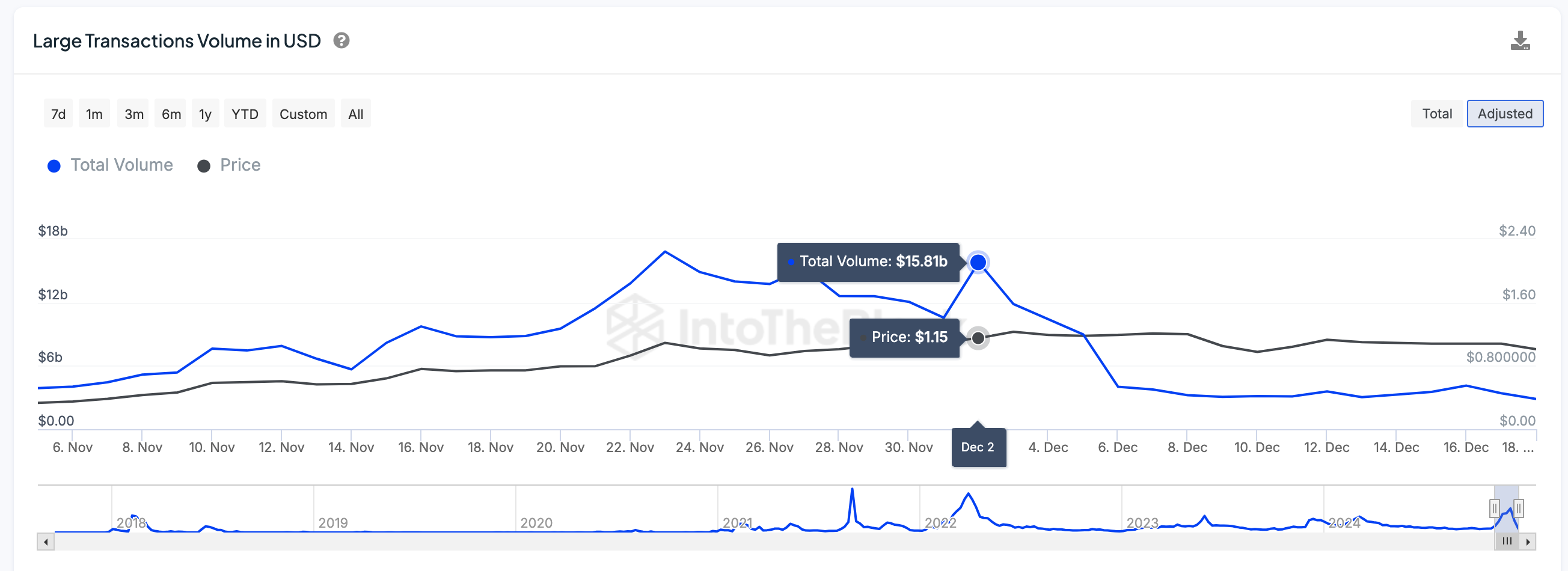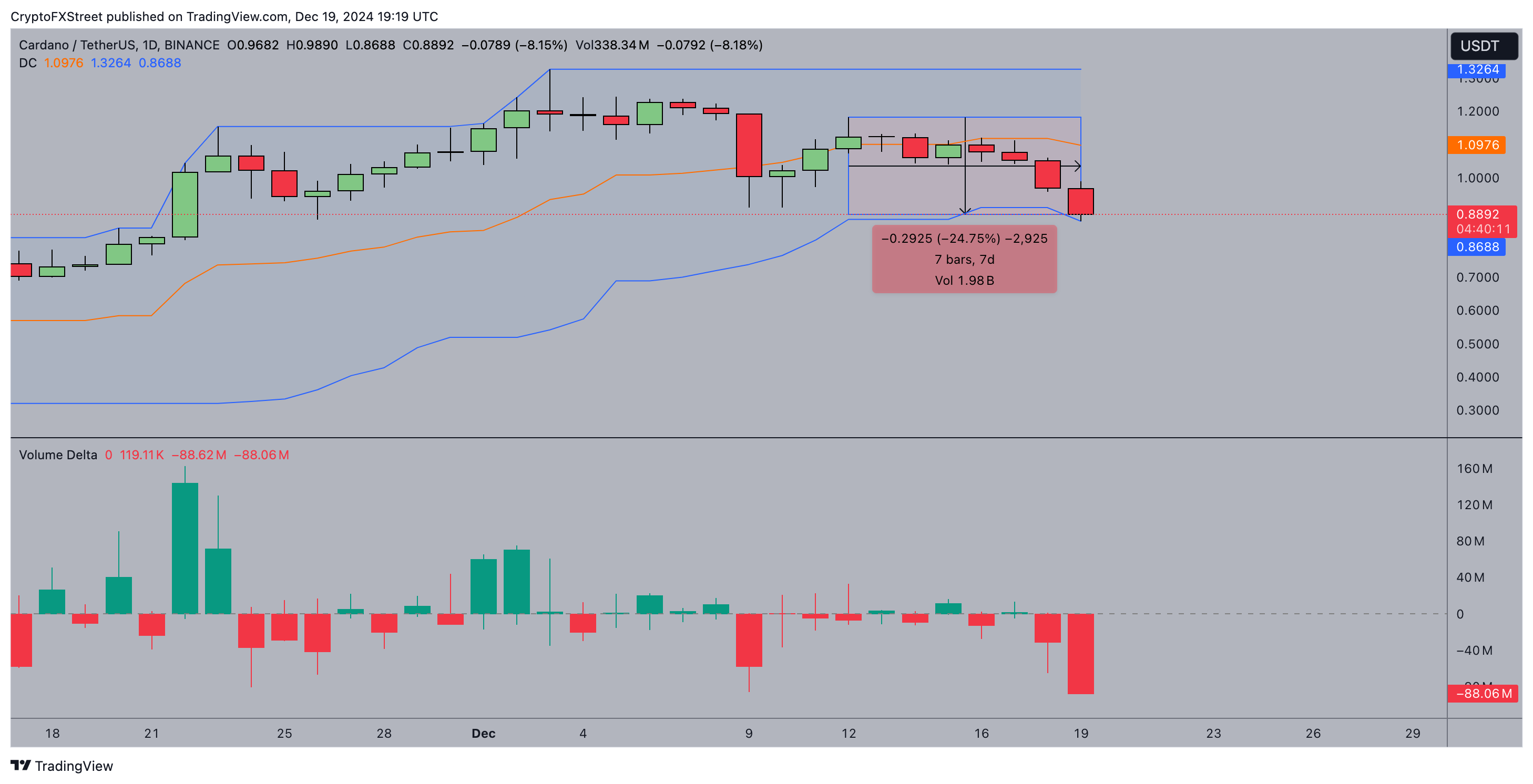Cardano Price Prediction: Bearish signal emerges as ADA eyes rebound to $1.20
- Cardano price tumbled below $1 on Thursday as prospects of fewer Fed rate cuts in 2025 triggered a sharp market-wide sell-off.
- Large transaction volumes have declined by $13 billion between December 2 and December 18, signaling disinterest among whale investors.
- Technical indicators highlight further downside risks ahead for ADA if the $0.9500 support fails.
Cardano price tumbled below $1 on Thursday as traders reacted to the US Fed hinting at fewer rate cuts in 2025. On-chain data shows a persistent decline in whale demand for ADA over the past two weeks.
Cardano plunges below $1 amid post-FOMC sell-off
On Wednesday, the US Federal Reserve (Fed) concluded its December FOMC meeting with a 25-basis-point interest rate cut.
But despite matching analysts' expectations with a third consecutive rate cut, the accompanying statement hinting at fewer cuts in 2025 sent bearish aftershocks across the crypto market.
 Cardano price action (ADAUSDT) | December 19 2024
Cardano price action (ADAUSDT) | December 19 2024
The chart above shows how ADA prices plunged as low as $0.8800 on Thursday, bringing its weekly time frame losses to the 25% mark.
While Cardano’s ongoing downswing aligns with the global market dip in the aftermath of the Fed’s more hawkish outlook. The 25% loss has seen ADA fall behind rival Layer-1 coins like ETH, SOL and AVAX.
ADA whale demand drops by $13B, intensifying downside risks
When a mega cap asset like Cardano performs below the market average, it signals the presence of lingering internal bearish catalysts.
The on-chain data trends show that ADA has struggled to attract demand since December 2, two weeks before the FOMC meeting triggered a market-wide sell-off on Wednesday.
In indication of this stance, the IntoTheBlock chart below tracks the daily volume of single transactions that exceed $100,000 in value.
This serves as a proxy for monitoring trading of whale investors on a blockchain network.
 Cardano Whale Transactions vs. ADA Price | Source: IntoTheBlock
Cardano Whale Transactions vs. ADA Price | Source: IntoTheBlock
Looking at the chart above, Cardano large transactions totalled $15.8 billion on December 2.
But since then, whale investors have progressively scaled down their demand for ADA.
The latest data shows that only $2.9 billion worth of large transactions were executed on December 18, reflecting a $13 billion decline from the monthly time frame peak.
Such a massive decline in whale transactions could be bearish for two key reasons.
First, large transaction volumes often indicate significant market activity by institutional or high-net-worth investors.
A sharp reduction in such activity suggests waning confidence among Cardano’s largest stakeholders, potentially discouraging smaller retail investors and triggering further sell-offs.
Second, reduced whale participation implies lower liquidity in the ADA market and heightened risk of rapid price downswings during a crypto sell-off.
This partly explains why ADA price has tumbled further than the likes of ETH, SOL and AVAX.
Cardano price forecast: $0.8500 support at risk
After a 25% decline in the past week, the Donchian Channel (DC) and Volume Delta technical indicators now paint a bearish picture for Cardano’s short-term price action and market momentum.
The Donchian Channel reflects that ADA is currently testing its lower boundary at $0.8688, a critical level of support.
The upper boundary at $1.3264 highlights significant resistance, while the midline at $1.0976, corresponding to prior price consolidation, now serves as a strong resistance zone. The breach of the midline in recent sessions suggests a shift in sentiment from neutral to bearish, with sellers clearly dominating.
Price trading near the lower boundary implies heightened downside risks. If ADA fails to hold above the $0.8500-$0.8688 range, the next likely support zone lies near $0.8000.
 Cardano Price Forecast
Cardano Price Forecast
The Volume Delta adds further confirmation of bearish momentum. The -88.06 million delta clearly shows that sell-side activity significantly outweighs buy-side interest. This overwhelming selling pressure is consistent with waning whale activity, as highlighted by the $13 billion drop in large transactions since December 2.
The lack of significant green volume bars signals weak buyer confidence, making it unlikely that bulls can mount a meaningful recovery in the near term. Combined with the Donchian Channel, this suggests that even if ADA bounces back towards the $1.00 psychological level, it would face strong resistance at the $1.0976 midline.
If sell-side dominance continues, ADA will likely break below $0.8500, with the next major support near $0.8000.

